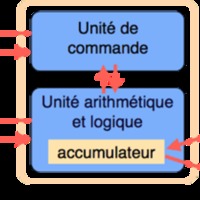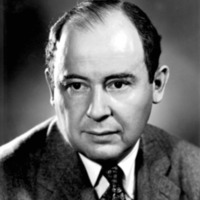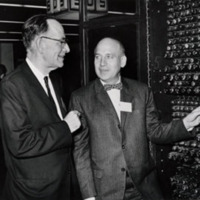Modèle de von Neumann
Dublin Core
Titre
Sujet
Description
En 1945, John von Neumann, qui travaillait dans le projet ENIAC avec J. Presper Eckert et John Mauchly, publia la description d’un modèle nouveau pour l'architecture des ordinateurs. Ce modèle est caractérisé par :
- la séparation des fonctions de séquencement et d'exécution des instructions à l’intérieur du processeur ;
- la notion de programme enregistré : les programmes, dont les instructions sont codées sous une forme conventionnelle, sont stockés dans la mémoire, comme les données.
Créateur
Animation Flash : Maxence Raoux
Source
Photo von Neumann : Wikimedia Commons
Origine : Los Alamos National Laboratory
Photo Eckert-Mauchly : Computer History Museum
Droits
Photo von Neumann : Wikimedia Commons Origine : Los Alamos National Laboratory.
Unless otherwise indicated, this information has been authored by an employee or employees of the University of California, operator of the Los Alamos National Laboratory under Contract No. W-7405-ENG-36 with the U.S. Department of Energy. The U.S. Government has rights to use, reproduce, and distribute this information. The public may copy and use this information without charge, provided that this Notice and any statement of authorship are reproduced on all copies. Neither the Government nor the University makes any warranty, express or implied, or assumes any liability or responsibility for the use of this information.
Photo Eckert-Mauchly : Image courtesy of Computer History Museum.


